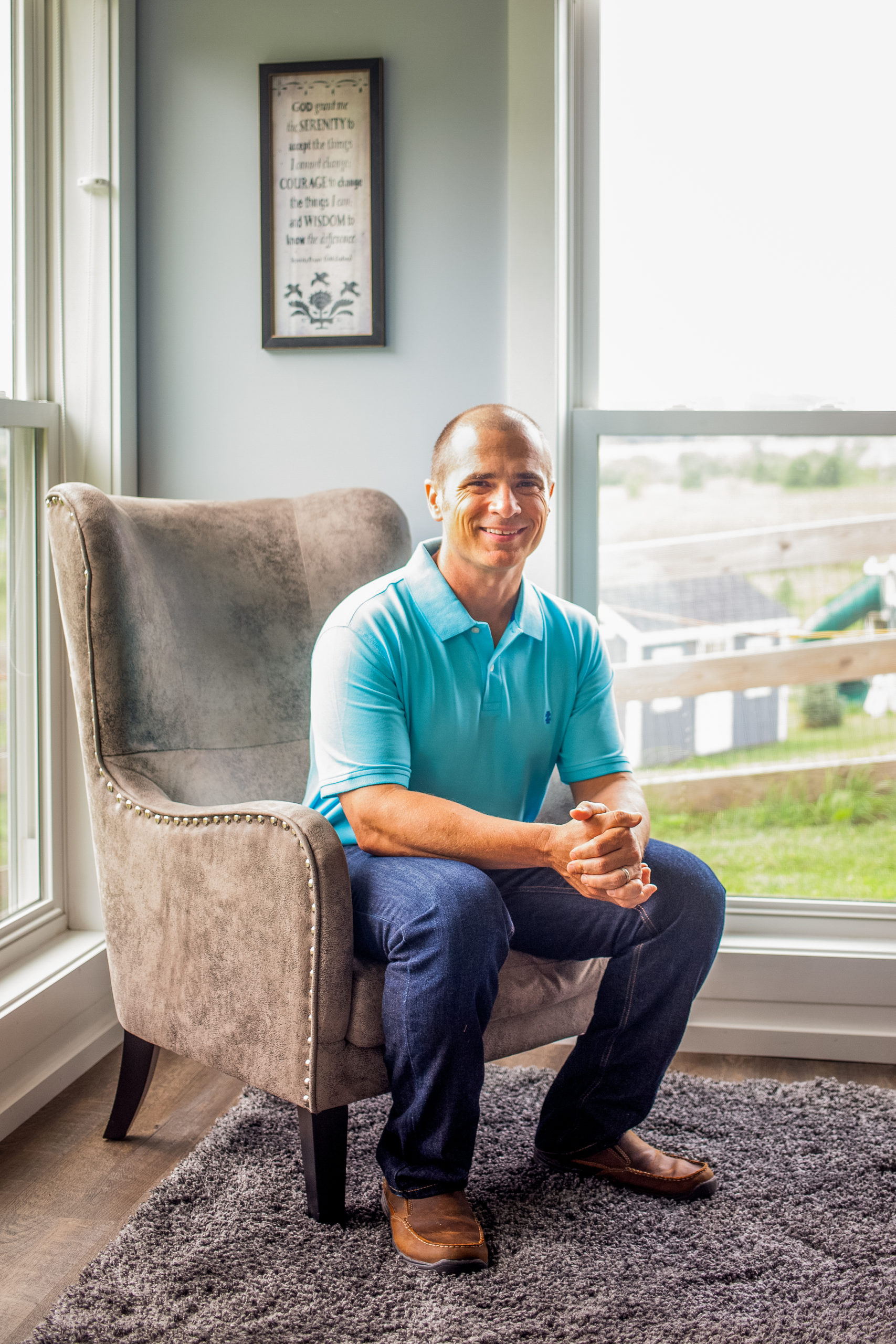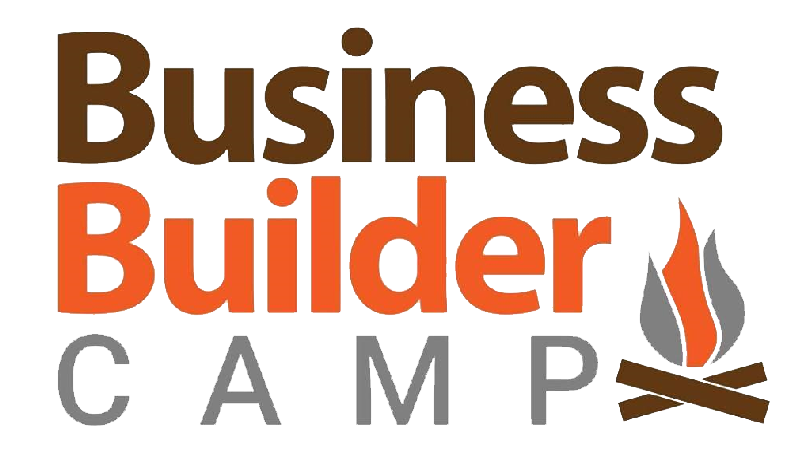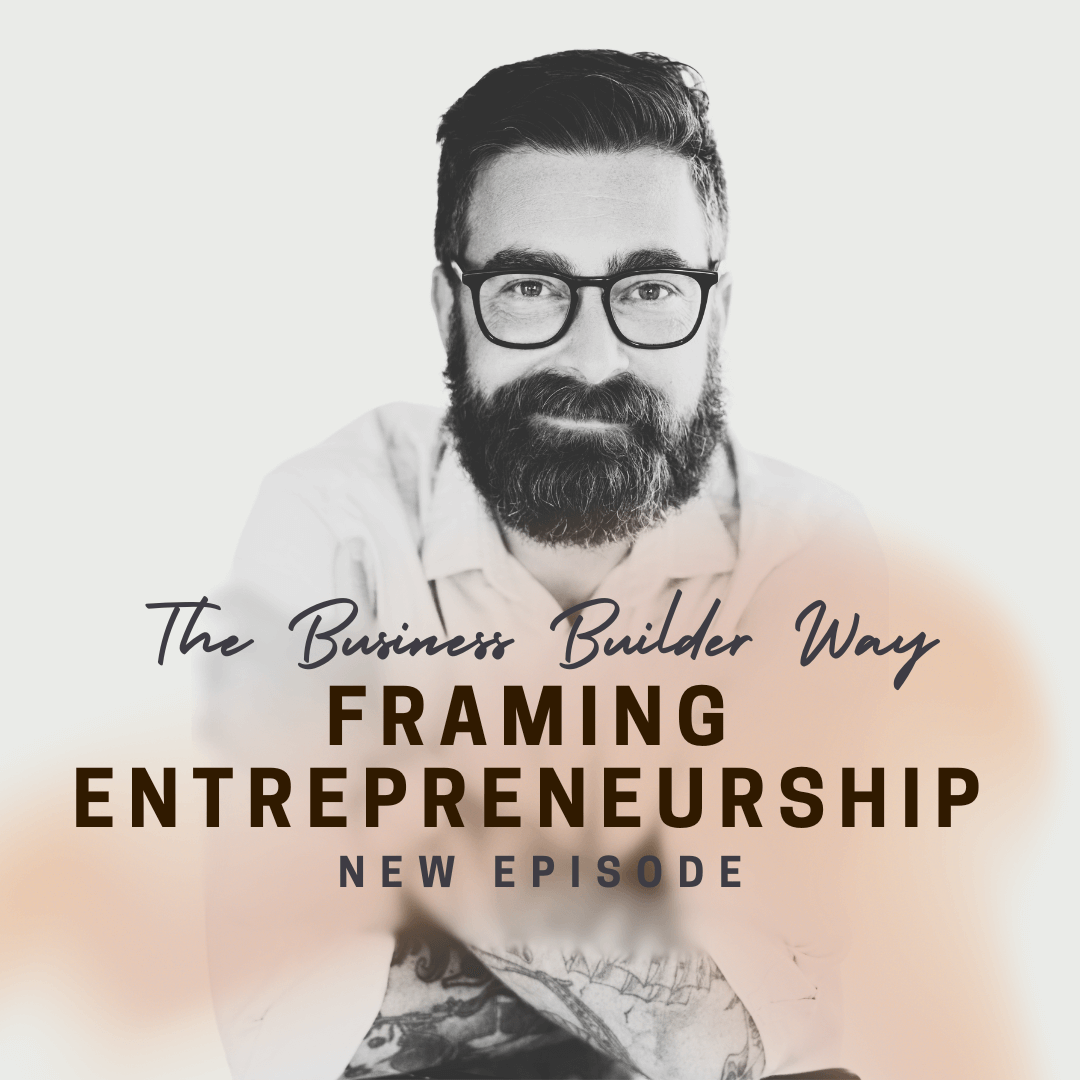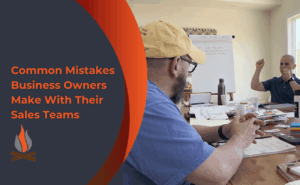Wayne Herring00:00:00 - 00:01:57
Business builders today, we're joined by Chris. Chris is the co owner of Dynamic Construction and DC Materials. They're the largest framing contractor in Wisconsin and in the upper midwest. But what he's done is put together systems that provide both the carpentry work, the actual framing work, and he's also combined that with having the lumber yard so that he can package that altogether. And so he's not waiting on materials and has control of that value stream. Chris shares his story of being mentored by others and how he got into this, and this is an episode that'll inspire you to think bigger and think beyond the conventional boundaries of your business. Chris could have stayed, quote, just a framer, and being just a framer can be a great business. But he thought bigger and thought about how he could bring more of the value chain together.
Wayne Herring00:00:58 - 00:01:00
Hey, Chris. Welcome to the Business Builder way.
Chris Tatge00:01:00 - 00:01:02
Hi, Wayne. Thanks for having me on.
Wayne Herring00:01:02 - 00:01:28
You bet. So you're coming to us from Wisconsin today. I am. And you have built a framing company, and the business is operating in a unique way. And you told me before we got started that you always like sharing and giving back and telling people what you're doing in your business. That's perfect. That's what we're looking for here. So if you would, can you just, like, tell us your story? How did you how did you get to this point?
Chris Tatge00:01:29 - 00:01:46
Yeah. It's 28 years in the trades. So I started out as a framing carpenter, 17 years old. I didn't do well in school and traditional learning. And when I put on a tool belt, something clicked, and I was good at it. And I liked it. I like being in the sun. I like working hard.
Chris Tatge00:01:47 - 00:02:41
So 17 years old, learning carpentry, self employed by 20. I had a contract to frame 26 houses over the course of a year with 2 employees. I had absolutely no business starting my own business at that age. So continued working in and out of different roles in the framing world. Right? 2012, 2013, sort of thought the pinnacle of success was building large wood apartment buildings, labor only, having 20 employees, and keeping the money that was left over after after the building was done being built. Right? So I'm still wearing a tool belt every day. Got involved with the National Framers Council around that time, and I met these guys who were carpenters, but but they were also more than that, they were very much businessmen. They had real legitimate businesses, worked in offices, had staff.
Chris Tatge00:02:42 - 00:03:28
And the big difference was they were buying and selling their own lumber along with their framing labor packages. So I decided that was the route I wanted to go. Anybody who's had to work into a supply chain ever knows that that's an uphill battle. It takes a lot of time to get the right distributors, parts and pieces. So after a couple years of building relationships, I sold my first lumber package in 2019. Since then, over the course of the next 3 years, our company grew 1126%. We haven't grown as rapidly since then, but we are continuing to grow and and serve sort of south central Wisconsin market. We're now the largest framing contractor in Wisconsin.
Chris Tatge00:03:29 - 00:03:48
We're the fastest growing building materials supplier. Mhmm. I just finished, a yard expansion at my soon to open lumber yard. I added a 100,000 square feet of gravel, a second building, and we're doing office build out as we speak. So, yeah, that's the cliff notes on my time in carpentry.
Wayne Herring00:03:49 - 00:03:55
That was that was a great job, on the cliff notes or Chris notes. These are Chris notes.
Chris Tatge00:03:55 - 00:03:55
Sure.
Wayne Herring00:03:56 - 00:04:04
So what was the story? What was the impetus to get that first contract with can you say it was 26 houses? Yeah. Yeah.
Chris Tatge00:04:04 - 00:04:30
Yeah. I, I was good carpenter and I had a really great mentor guy named Don Ludzak, who taught me well. And, he asked me one day, because I had been going to sort of community college here and there. He asked me, are you gonna keep going to community college or what's your plan? I said, no. I like doing this. And he said, well, I'm moving to Minnesota. Do you want me to help you get out on your own? I said, sure. So he said, okay.
Chris Tatge00:04:30 - 00:04:41
You've gotta find a guy that I can teach. And he taught this guy for the next 6 months and then got me set up with the right context to get that contract. Yeah.
Wayne Herring00:04:41 - 00:04:50
That's really great. And yeah. And I have a I mean, I think a lot of people do, but I've I've got a mentor story like that.
Chris Tatge00:04:50 - 00:04:50
Yep.
Wayne Herring00:04:50 - 00:04:53
So Don must have been a a gem.
Chris Tatge00:04:53 - 00:05:03
He is, and I still keep in touch with him. I think he gets a kick out of talking with me and started hearing what what things have happened in my career. So
Wayne Herring00:05:04 - 00:05:15
Yeah. That's really neat. So so you did that, and that was that did that did that get to be kind of a growing concern, like, a a business and the same thing? Like, did you have a building and trucks and It
Chris Tatge00:05:15 - 00:05:59
was it was just a trailer. Right? And so most, most guys, most guys, I'm no exception. Most guys start their framing company and they have this plan that they're going to build houses and then they're going to train another lead guy who's also going to build houses for them. And that's how you're gonna grow. It it usually doesn't shake out that way. Usually, you get someone on board, and that's a low barrier to entry, single family homes. And so you'll teach these guys, and then they soon realize that all they really need is a pickup truck and a skill saw and a nail gun, and they go out and get their own contracts. So that was my plan, and it it didn't quite work out.
Chris Tatge00:05:59 - 00:06:05
And that's sort of why I moved one of the reasons I moved into the multifamily. Easier to scale.
Wayne Herring00:06:06 - 00:06:11
And so then it kinda along the journey, you talked about 2012, 2013.
Chris Tatge00:06:12 - 00:06:12
Mhmm.
Wayne Herring00:06:12 - 00:06:14
And what was different about 12/13?
Chris Tatge00:06:15 - 00:06:23
Well, I moved into multifamily construction. Right? Okay. Out of single family, things were starting to pick back up in construction in general.
Wayne Herring00:06:24 - 00:06:26
After the after the the whole recession
Chris Tatge00:06:26 - 00:07:06
After the whole recession, and nobody's really struggling as much. Right? And so that's when I started dynamic construction, current iteration of my framing company. Okay. And again, just labor only multifamily framing contracting. Right? So if I'm a lead carpenter, I can build a single family home in 2 weeks. Right? And that's 2,000 square feet with 2 other guys. If I'm a lead carpenter on a multifamily building, I can build a 60,000 square foot building in at the time, it would have been about 8 weeks with 15 guys. And it's a lot more money involved.
Chris Tatge00:07:06 - 00:07:11
There's a lot more moving parts. But if I control all of them better, then I'm gonna be more profitable.
Wayne Herring00:07:12 - 00:07:20
Gotcha. And then you you joined the framing council framers council. Yeah. When was that roughly?
Chris Tatge00:07:20 - 00:07:21
That would have been 2014.
Wayne Herring00:07:22 - 00:07:31
So you go, a a meeting somewhere. And was there a pivotal conversation where you met somebody, and you're like, maybe I could do this differently?
Chris Tatge00:07:31 - 00:08:18
Sure. It was interesting. At the time, 2014, the North American standard for how to install wood roof trusses, the standards were set at a small office in Madison, Wisconsin, 20 minute drive from my house. They were also managing the National Framers Council. Mhmm. So I got signed up and I drove there to get my safety plan and drop off a check. And, walked in the building and they had never had a framer in there before to talk about sort of the products that they put out there that have a huge effect on what I did every day. So it was interesting for all of us, for me to sort of learn where these standards come from and thought process behind, and for these people to learn how I reacted as a framer to the standards they set.
Chris Tatge00:08:18 - 00:08:45
So a lot of conversations from that. Met a gentleman named Kenny Shiflett, another guy named Scott Stevens. Scott's in Baltimore. Kenny's in Manassas, Virginia, but they were both framing 5,000,000 square feet a year. Very successful. Met George Hull, who holds Hull and Associates in Dallas Fort Worth area. George frames 12,000,000 square feet a year. Well, yes, about pivotal conversations.
Chris Tatge00:08:45 - 00:08:46
Right?
Wayne Herring00:08:46 - 00:08:46
Yeah.
Chris Tatge00:08:46 - 00:09:27
So I'm getting involved in the association. I'm doing a bunch of free work, right, which is, you know, you get a lot out of this any association you're willing to put time into. And I'm in Milwaukee at sort of our marquee event, the Framers Summit, and it's actually in Milwaukee again this year. And I'm talking to Bruce Jones, very successful framer from Pennsylvania. He tells me he's had a few drinks. He's bragging. He just bought 3 semi loads of half inch OSB for $4 a sheet. And I went on Menard's website, Menard's app, and saw that OSB was selling for $8.50 a sheet, and I thought, wow.
Chris Tatge00:09:27 - 00:09:55
I'm missing out on something. And that was sort of the moment. And so from there, I started talking. All those guys gave me a lot of time on the phone. Yeah. I'd schedule a phone call with George, and he'd spend an hour telling me how he watches lumber markets. And, you know, all those guys would give me their tips and tricks on how to grow my business. And and I took notes, and those notes were hanging up on my up on my cork board for a few years.
Chris Tatge00:09:55 - 00:10:09
I'd reference them. But it was really learning from those guys being open to hearing what they had to say, and and that's what launched DC Materials, our material supply business.
Wayne Herring00:10:10 - 00:10:16
Got it. Yeah. About how many people are employed by Dynamic Construction? Do you see materials now?
Chris Tatge00:10:16 - 00:10:20
We keep when we're busy, we're running about a 130 people.
Wayne Herring00:10:21 - 00:10:27
And do you have so you said you're doing this lumber yard, and you're gonna have administrative type buildings there
Chris Tatge00:10:27 - 00:10:27
Yep.
Wayne Herring00:10:27 - 00:10:32
Plus the gravel lay down and whatever else you do for racking or whatever. Yeah.
Chris Tatge00:10:32 - 00:10:33
Storage. The whole thing.
Wayne Herring00:10:33 - 00:10:37
Yep. And then you have an office for the construction company, I assume.
Chris Tatge00:10:37 - 00:10:38
We do. Yep.
Wayne Herring00:10:39 - 00:10:51
And what is your journey? But, Chris, how have you changed? How have you transformed from framer to great. And for anybody not watching, his eyes just got real big. I love that. Like, yeah, how have you changed?
Chris Tatge00:10:51 - 00:11:51
It's it's been it's you know, I mentioned I didn't do well in school. I didn't have any confidence. I didn't think I was a smart person. One of the things I I love the framing industry because framing has given me the confidence that I have now in life. So the first thing I was really good at made me realize I was smart, and I was smarter than most of the other guys who were doing what I was doing at the time. That confidence parlayed into me being able to go from really seeing myself as a framer, which I still do, but also seeing myself as a businessman and an industry leader. Being able to understand that I can take on these roles and think of myself as more than just a framer has has helped me understand the things that I need to learn, given me the confidence that I need. Right? I've I've got a I've got a family relation who is an executive in the airline industry, meets with senators, meets with all kinds of very important people.
Chris Tatge00:11:51 - 00:12:07
As my company is growing, I asked him, what's it like being in those meetings? What's it like being in those rooms with those important people? And, he sort of laughed. And he said, you know, Chris, the more and more I move up, the more I realize there are idiots at every level.
Wayne Herring00:12:07 - 00:12:08
Sure.
Chris Tatge00:12:08 - 00:12:37
Right? So I didn't take that to mean that there are idiots all around me. I've always taken that as I belong in the room just as much as anyone else. Right. Right? No matter who you are, where you're at, we're all just trying to figure it out. And if you view everyone that way, it's a lot easier to navigate. Right? So for me, the journey is it's been about realizing I can do the things I set my mind to. Maybe I'm also one of the idiots, but we're all We we
Wayne Herring00:12:37 - 00:12:39
all are sometimes. That's the secret. Right? We all
Chris Tatge00:12:39 - 00:13:10
And I might not always make the right decision, but if I make a wrong decision, I know I'm the kind of person who's gonna push really hard to make it right. I, you know, I tell this story a few times. I missed a speck when I first started selling wood. It was a big deal. Hardwood. It was I needed some fire treated dug for large number 1, right, which doesn't exist in the Midwest. Found out that I needed it at 8 o'clock in the morning. These guys needed it the next day to start building a huge, huge project.
Chris Tatge00:13:10 - 00:13:41
Biggest contract I had ever had. I missed it. Bunch of people along the way missed it. 8 AM figured it out. 1 o'clock in the afternoon, I was in my truck with a trailer driving to Denver, Colorado to get the stuff that I needed. Right? So I screwed up, but I turned it around. And and now it's a great story. People ask me, you know, if if it helps me sell, helps me at least put things in the right context for what I'm willing to do to make sure their job goes well.
Wayne Herring00:13:41 - 00:13:52
Can you tell us a little bit about the culture of the companies? And and do you look at them the same as being DC Materials and Dynamic Construction? Are they the same? Do you are they different?
Chris Tatge00:13:52 - 00:14:49
Yeah. That's a that's a great question. Part of the onus to starting DC Materials is I was sort of the make or break on my jobs and my profitability somewhat depended on whether or not I had a motivated lumber salesman who was gonna make sure that I got what I wanted when I wanted it. Right? Oftentimes, I need some metal connector. Is he gonna pay the $30 shipping so I have it tomorrow, or is he gonna wait for the route truck 4 days from now? And so my profitability was dependent on those guys. I started DC Materials to have control so that I can make the field labor as successful as possible. So everything we do on the DC Materials supply side is informed by what's gonna be best for the framers in the field, what's gonna make the labor successful. And so if we need to spend more money to expedite shipment, we do it.
Chris Tatge00:14:49 - 00:14:56
If there's a product that's more expensive, that's gonna be an easier installation, we pay for it.
Wayne Herring00:14:56 - 00:14:56
Sure.
Chris Tatge00:14:56 - 00:15:22
And so not only that, but be able to look at the job as a whole. Right? Be able to speak to the lumber and the labor and and switch out some products that are gonna help the bottom line and help the general contractors save money and pass that saving on to the developer. But very much the attitude of DC Materials is it's there to make the labor successful, right, and and serve the labor side.
Wayne Herring00:15:23 - 00:15:28
So they they serve each other, but they do operate somewhat independently.
Chris Tatge00:15:28 - 00:15:30
They do. Yep. Yep.
Wayne Herring00:15:30 - 00:15:37
And I asked you two questions, which I have a bad habit of doing. The the other question was, tell me about the culture of the companies Yeah. That you built.
Chris Tatge00:15:38 - 00:16:12
Yeah. It's very much I don't micromanage. I find people who are responsible, and I let them be responsible. So here are the things you need to take care of. And if those things are taken care of, the rest of the time is yours. Set your own sched you know, that it's not total freedom, but, you know, you have to respect people. Right? I think one of the things people and maybe it's a little deep, but people want the dignity that comes along with the responsibilities they have. Right? And they want that respect.
Chris Tatge00:16:12 - 00:16:34
And and I I found that if you treat people respectfully, you treat them with dignity and let them be responsible for their own responsibilities. It it goes well. And that also lends itself really well to me having the freedom to make high level decisions and guide the company at the high level when these people are taking care of the stuff they're supposed to be on their own.
Wayne Herring00:16:34 - 00:16:53
Yeah. Respect people, a value of yours. You also you seem quite humble, open minded, willing, ask questions, good questions. You acknowledge mentors. Yeah. So it's part of who
Chris Tatge00:16:53 - 00:17:18
you are. Right. Yeah. Yeah. It's, you know, you find success, it's easy to get wrapped up in it. I I think that this is a fun game, and I don't take it so seriously that stress out at night. It it would be really easy to find success and you make a little bit of money and and sort of holding onto that too tightly is I think can be cumbersome. Right? I wanna make the best decisions Yeah.
Chris Tatge00:17:18 - 00:17:47
For my business, and I don't wanna make the decisions based on I wanna make a bunch more money so that I can fly business class or or whatever. Right? I wanna make the best decisions because I'm having fun and I enjoy building a business. And and and that's the way I wanna think. And I don't wanna juice the turnip when it comes to my operations. I want everybody to win. I want everybody to do well. I want everybody to enjoy it. I don't need to suck every bit of juice out of this thing that I can.
Chris Tatge00:17:47 - 00:17:47
So
Wayne Herring00:17:47 - 00:17:51
Is building a business like building a multifamily home?
Chris Tatge00:17:51 - 00:18:27
Well, I suppose you could say that. You know? Free construction planning is probably the most important part. So my business partner, Eli, is he's a much better project manager than I am. I I go around selling magic beans to everybody telling them about the way things should be. He's much more realistic. He always says, you know, if I've done my job by the time the building starts, it's on cruise control. So putting in the time ahead of time, understanding what needs to be done so that everything's there, it does help. Right? So yeah.
Chris Tatge00:18:27 - 00:18:32
Yeah. Absolutely. It can be. It's different parts and pieces all coming together for things to go well.
Wayne Herring00:18:34 - 00:18:54
You you and and you mentioned you had told me before we kind of officially started that this is a unique model that you're implementing here. Your company is full having the framing business, but also the lumberyard that's unique. Can you tell us more about that, and why is that beneficial to the clients that you serve?
Chris Tatge00:18:54 - 00:19:40
Of course. It's unique to Wisconsin. The the model exists outside of Wisconsin, Mid Atlantic, Texas, California, Sunbelt. So but in Wisconsin, you know, 5 years ago, local lumber yards would sell material packages to a general contractor. That general contractor would contract labor separately. That local lumber yard would also buy components, so premanufactured walls and trusses, pass them through, and sell those to the general contractor. I I control both. So the general contractor has one point of contact for labor, the loose lumber, and the wood building components.
Chris Tatge00:19:41 - 00:20:31
What sort of value does that add to my customer? When I look at a building plan, I look at it as a framer, and so I see process. I see how all the parts and pieces interact with each other. I can envision the assemblies, and I can understand what drawn well and what could be improved. Right? So not only can I speak to that side of things, I can take the materials that that building is drawn with and say, you know, if you switch this material for that material, you'll save $30,000? Right? It will value engineer and find value Yep. In a unique way. A lumber guy is gonna look at lumber and think a certain way. Labor only framers gonna look at it another way. I can speak to both.
Chris Tatge00:20:31 - 00:20:32
That's that's unique.
Wayne Herring00:20:32 - 00:20:33
That makes sense.
Chris Tatge00:20:33 - 00:20:54
Helps bring an expert opinion to the table. And, historically, you know, framers don't get involved really early in construction process, which has never made a lot of sense to me. I I think there's I think framing contractors could do a little bit better jobs or presenting themselves in a way that's more consumable for design professionals.
Wayne Herring00:20:54 - 00:20:55
Yeah.
Chris Tatge00:20:55 - 00:21:16
Architects, engineers, we tend to work on cell phones and not via email and PDFs. But if you think about it, we're providing these structures that are 50,000 to 500,000 square feet. We're the ones creating these things in reality, and we should be involved a lot earlier than we have typically been.
Wayne Herring00:21:16 - 00:21:17
Right? Sure.
Chris Tatge00:21:17 - 00:21:22
So that's sort of what I work towards. That's the value that I add. Makes sense. Mhmm. Yeah.
Wayne Herring00:21:22 - 00:22:13
We have a a business builder in our community named Andy Richardson. Andy has a structural design firm, and he started it in, Beaufort, South Carolina, and now he's working to have some satellite offices using his system. But even for him, getting involved early with architects has been something that he's tried to add value and be available and helpful. And then, of course, hopefully, then that leads to him getting the job, but also being able to have the job and have it in a state where he knows he can do his best work rather than just being sort of stuck with whatever. It's, like, kinda too late because somebody has bought into that architectural vision before they Yeah. Is is this something we can even do?
Chris Tatge00:22:13 - 00:22:17
Absolutely. Yeah. Yeah. Getting in early is a huge component to it all.
Wayne Herring00:22:17 - 00:22:46
For all of you that that this work. You remind me, I just to, you know, to ask a question. We've got another business builder. His name is Matt, and Matt owns a company called Modus Construction, and he was building hotels for a big GC. He started out swinging a hammer and and being a a a carpenter, and now he's got a company, and and they're building 2 hotels. And I always tell him he's kinda like the guy on monopoly. And I'm like, you've really built a hotel. You build similar.
Wayne Herring00:22:46 - 00:22:55
Right? You stack all the houses together and you're actually, building those things. Yeah. So he's just done a, like, a premier property in the Poconos beautiful place.
Chris Tatge00:22:55 - 00:22:55
And
Wayne Herring00:22:55 - 00:23:20
now is working on a property that's owned by one of the national hotel chains in the Lehigh Valley in Allentown. And and he's at a place where he has some high quality people on staff, but it's like looking for the next now it's looking for the next project. And what what kind of advice would you give to a business owner like that? They've done their first few big projects. Can you think back to when you were at that stage and maybe what you were thinking, what was going on for you?
Chris Tatge00:23:21 - 00:24:18
Yeah. And my thing's always been sort of if I can create enough stability around me so that I can focus away from the day to day. And I think that's kind of a known thing. Right? For me, that stability has always meant good, trustworthy people, paying those good, trustworthy people what I need to so that they stay around. You know, you start thinking about how can I use equity to ensure that I'm gonna have key players for a long, long time? Because if I'm freed up and I give away some of the pie, I I can grow the pie. So what kind of are there software solutions that are that can help me with, you know, what am I spending my time doing, and is it really a waste of my time at this point? So thinking about those kind of things, not getting hung up on or getting having so much hubris that I think that someone can't do what I'm doing.
Wayne Herring00:24:19 - 00:24:19
Mhmm.
Chris Tatge00:24:19 - 00:24:49
I think that's easy to sort of fall into. Nobody can do estimates the right way if I'm not I have to be doing the estimates. So sort of, for me, being able to have that mind space open to Mhmm. Think big, think about the next thing, investigate opportunities, options, software, vision casting, that's what gives me the ability to continue to grow. Yeah. It's a powerful tool. So one of
Wayne Herring00:24:49 - 00:25:18
the things is just, you know, kinda wrap up for today. It's been great listening to your story. I appreciate kinda who you are and how you're sharing that here. The other thing that we talk a lot about in my community and business builders is the stuff beyond the business. Like, I had a friend, Tom Rubin, sort of book, and he used this phrase, how to harmonize an entrepreneurial life. Right? And so you had told me about there's 2 pieces of artwork behind you. 1 is a photograph. It's in Finland, and it's related to your your wife, and it's a church.
Wayne Herring00:25:18 - 00:25:39
And then there's also some artwork that, your son had done some years ago of jumping in the leaves, which is cool. So I know that you've got there's more to you than, quote, just this business. Yeah. How do you harmonize this entrepreneurial life that you have Yeah. And keep focus on other things that are important?
Chris Tatge00:25:40 - 00:26:28
I don't know that I would say I've harmonized it, but I would say that I'm constantly cognizant of it. You know? I think I I'll say this. My my family is important to me, my kids, and that experience, and my relationship with my wife, and all of our time together, it's incredibly important to me. I place a very high value on it. And I keep my mindset that all these I love my business, but I keep my mindset that I'll you know, the business is it should be it needs to be secondary to all those things. However, man, it's a constant struggle. Right? Yeah. Do I wanna do I wanna pick up my son from school, walk with my daughter, drop her off for 1st day? I did that this morning.
Chris Tatge00:26:28 - 00:27:14
Do I wanna catch up on emails? So I kinda with family dinner every night, that's nonnegotiable. Sporting events, all that stuff, those are all never miss things. I I got a wife who's incredibly gracious with me. And and so when I need to work at night, so the kids are in bed, and she's all good with me going down to my office and and pounding out emails for a few hours. I I don't know if when you're in a growth mindset, I don't know if you ever get to that sort of harmonized spot. I've got a huge amount of growth in front of me if I want it. I I don't think I ever wanna be sort of a nationwide framing contractor even even if that opportunity is there. Mhmm.
Chris Tatge00:27:14 - 00:27:40
So while I'm growing, I'm finding a balance. And I think once I sort of feel like I've achieved what I wanted in terms of growth, then I think the harmonized part comes in. But right now, all I can do is keep pushing back on the business and making sure that my family is a more it's a higher priority, and that really just translates to time. I'm I'm I mean, there's a way around that.
Wayne Herring00:27:41 - 00:28:06
Yeah. I made notes while you're talking, and I wrote constantly cognizant of it. Constantly cognizant our time together is important. I love my business, but just the fact that there's a but there, Chris. I love my business, but I can see that it's not everything. Right? Yeah. And then you said nonnegotiables. There's certain nonnegotiables that you've established that you're gonna show up for.
Wayne Herring00:28:06 - 00:28:24
That's beautiful. And then, the the other thing that I really thought, Chris, is I have a a good friend who's a pastor locally, but he's a a high growth pastor, excellent speaker, sought after to go do weekend retreats and things like that.
Chris Tatge00:28:24 - 00:28:24
Yeah.
Wayne Herring00:28:24 - 00:28:54
And we would go and sit at the local diner and draw on the back of the placemat. And one of the things we drew one day was balance. It had to do with balance, and it was, like, balance what, you know, what we talked about, and I heard within what you're saying is balance is is is a verb. It's a verb. It's it and you saying, you know, like, I'm harmonized. It's a harmonized entrepreneurial life would be like a noun. This is a harmonized entrepreneurial life. Yeah.
Wayne Herring00:28:54 - 00:29:16
You'll probably never have that. But the fact that you're constantly cognizant says that you are harmonizing as a verb constantly. Yeah. And you're working on that, and I think that's that's really cool. So thanks for sharing that. Of course. Chris, so appreciate you coming, sharing your story. We'll share links so people can look you up.
Wayne Herring00:29:16 - 00:29:21
Is there a place, like, is there a place people should contact you, and who would you love to talk to?
Chris Tatge00:29:22 - 00:29:51
I like talking with architects and engineers and design professionals that work in the space that I'm in. I like talking with other framing contractors who who wanna grow, guys who, maybe are like me that are labor only. I, you know, was on the phone. It's the airport in Seattle with a guy down south who wants to see take the same track I have. I love him in those conversations. You know, I'm interested in improving my industry. So I'm very active on LinkedIn. Hit me up.
Chris Tatge00:29:51 - 00:30:07
Happy to connect. If you wanna know more about my company, dcmaterialsllc.com. If you're a general contractor project manager in Wisconsin and you're dealing in wood, I can probably make your life a lot easier, a little more stress free. So
Wayne Herring00:30:08 - 00:30:12
That's great. You've become Kenny, Scott, and George, the people that poured into you.
Chris Tatge00:30:12 - 00:30:25
I have. Yeah. I have, and it's very humbling to have been able to ascend to a certain level of success in an industry that I I really love and I wanna continue to serve. So Yeah. Yeah. Awesome.
Wayne Herring00:30:25 - 00:30:29
Yeah. Great. Chris, thanks so much for joining us today. Have a good rest.
Chris Tatge00:30:29 - 00:30:30
Yeah. You bet.





